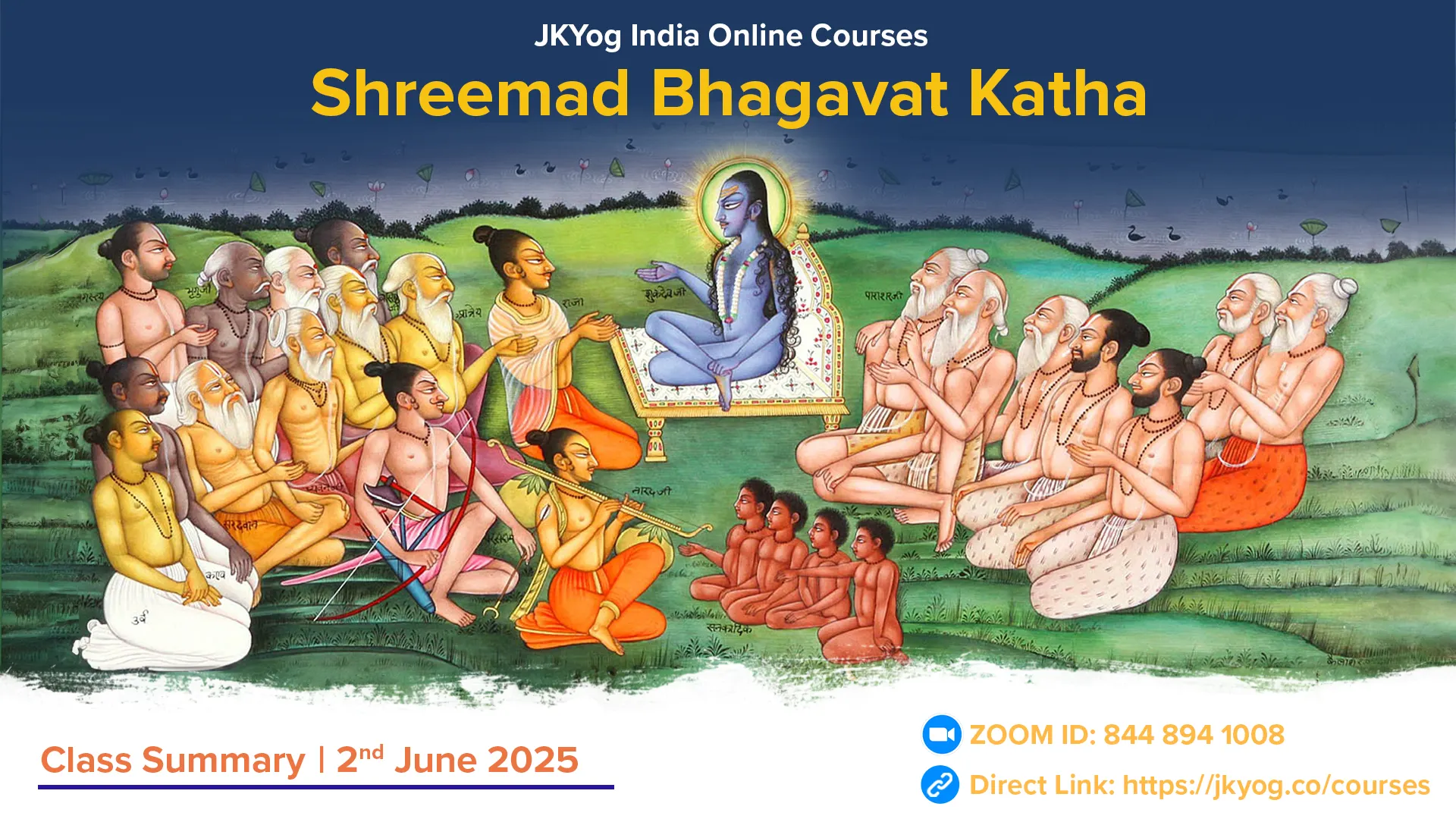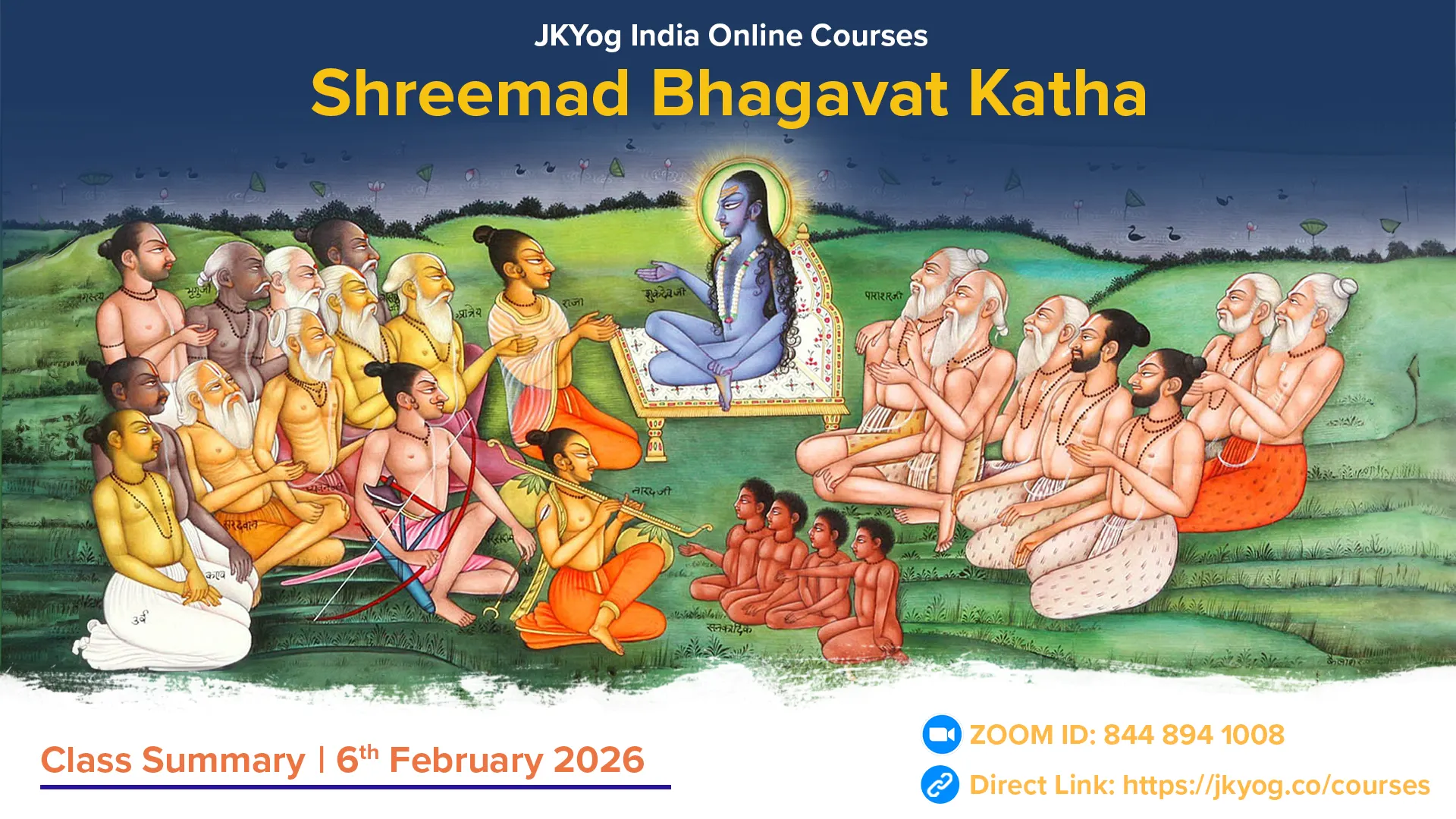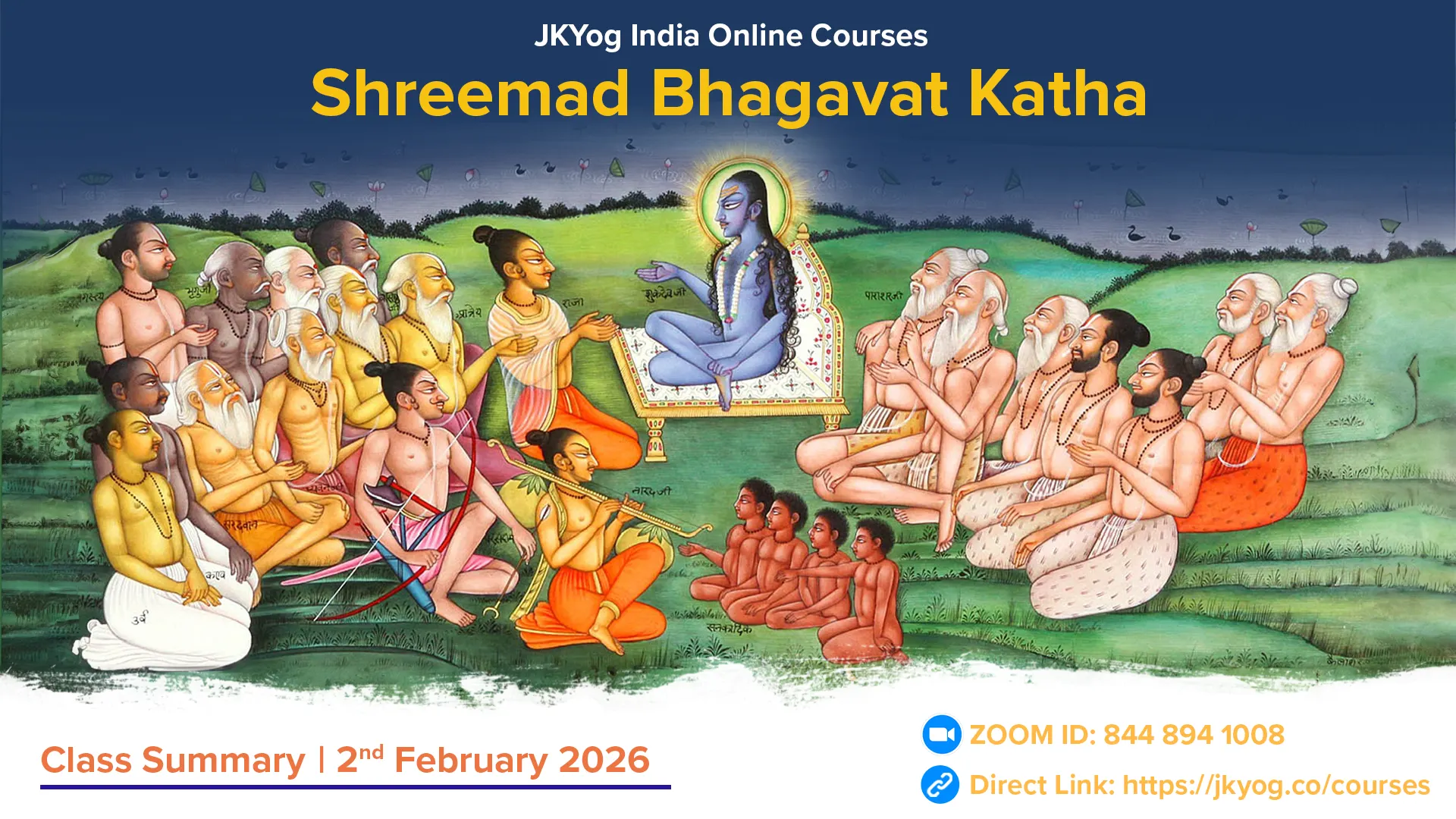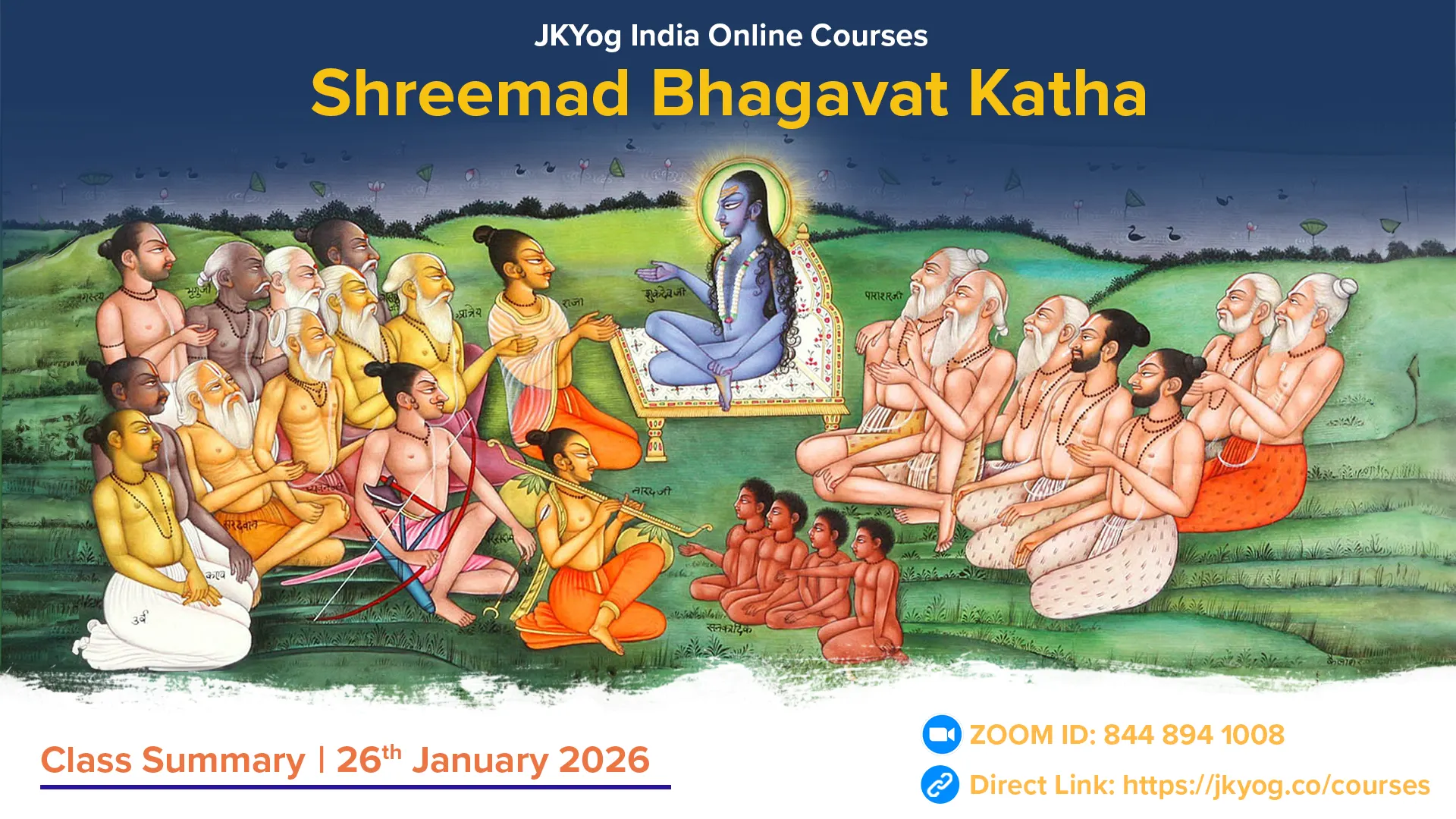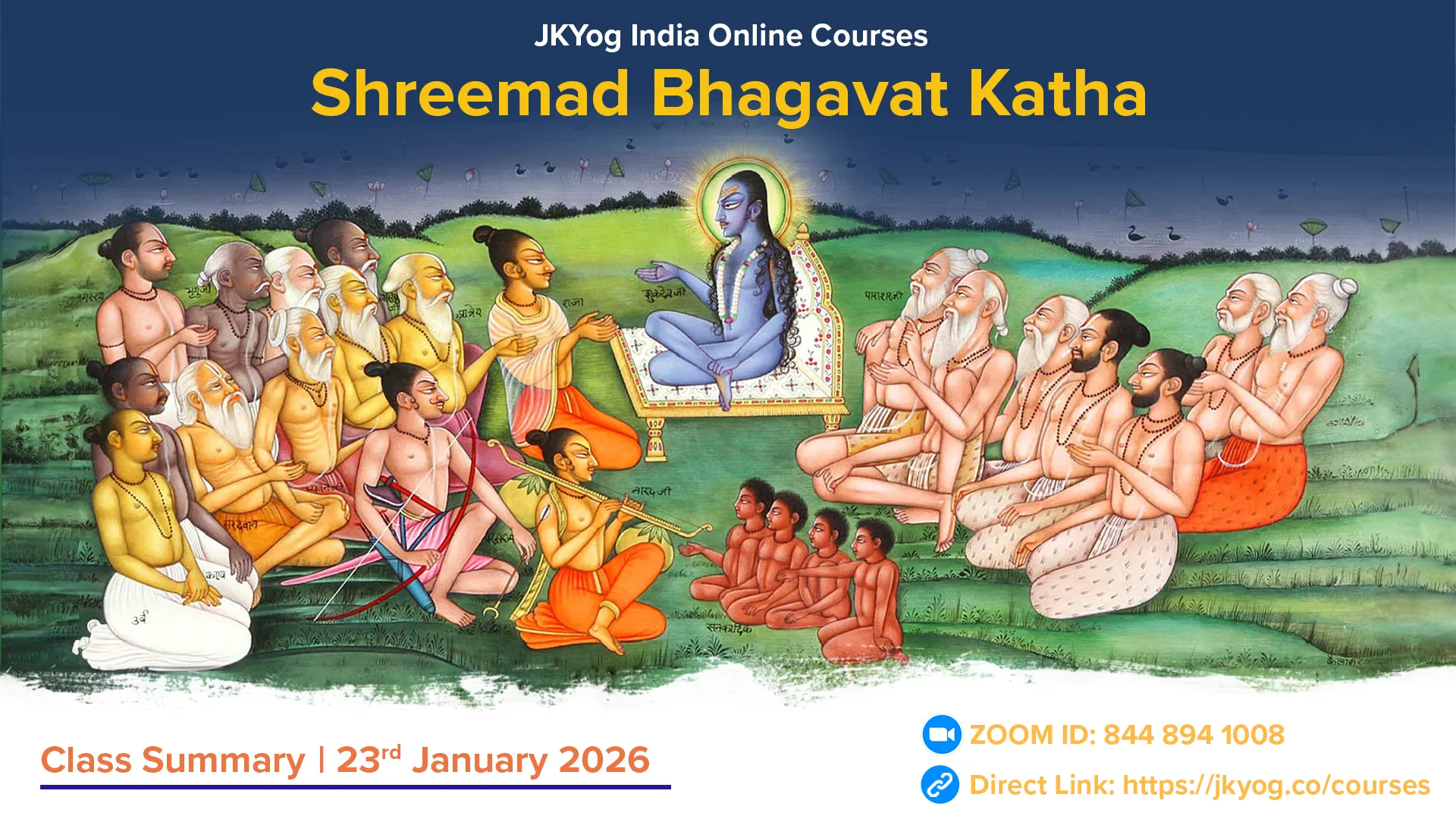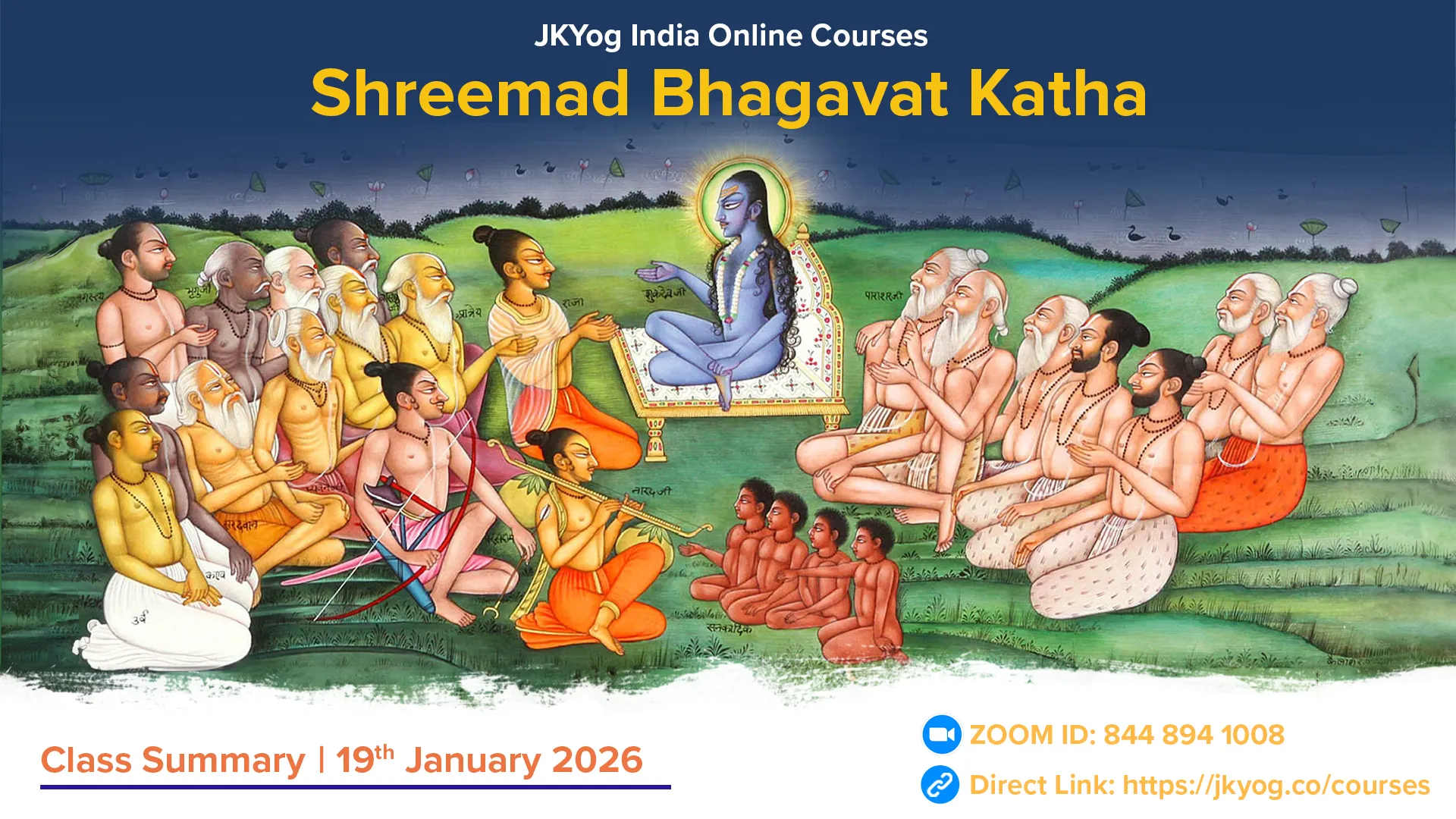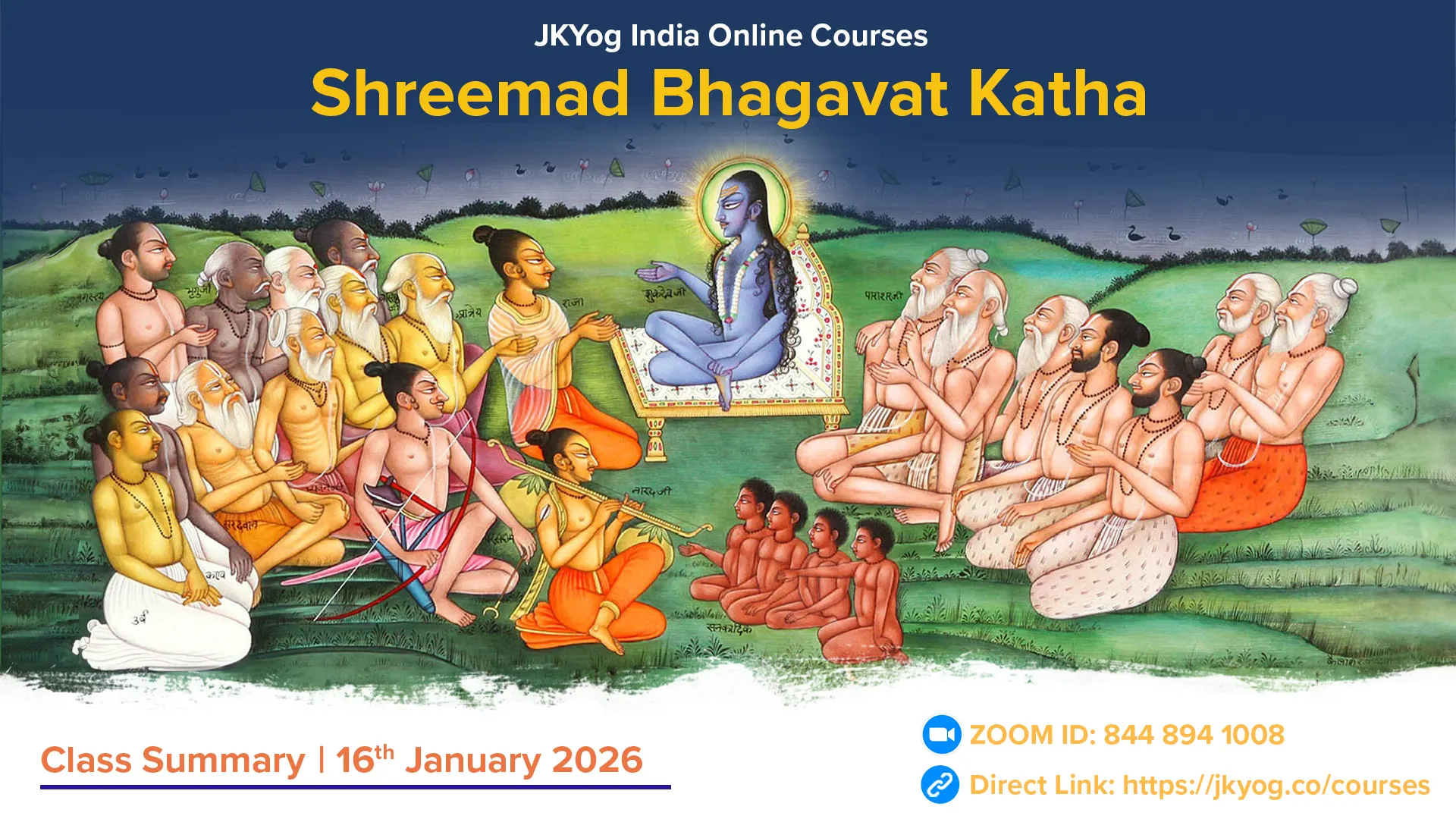Shreemad Bhagavat Mahapuran- Canto: 8, Chapters: 5- 7
Shree Shukadevji, after narrating the divine pastime of Shree Hari delivering Gajendra during the fourth Manvantar, begins to describe the events of the subsequent Manvantars to King Parikshit.
Fifth Manvantar:
- Name of the Manu – Raivat, who was the real brother of the fourth Manu, Tamasa. His sons included Arjun, Bali, Vindhya, and others.
- Indra of that Manvantar was named Vibhu. The deities were Bhutray and other divine beings, and the Saptarishis (Seven Great Sages) were Hiranyaroma, Vedashira, Urdhvabahu, etc.
- Bhagwan’s Avatar – From the womb of Vikuntha, the wife of the sage Shubhra, Bhagwan incarnated as Vaikuntha. He appeared with the supreme deities, and being pleased with the prayers of Lakshmiji, He created Vaikuntha Dham, which is the most exalted of all worlds.
Sixth Manvantar:
- Name of the Manu – Chakshusha, son of Manu Chakshu. His sons were Puru, Purush, Sudhyumna, and others.
- Indra of that Manvantar was named Mantradruma. The deities were Aapya and others, and the Saptarishis were Havishyamaan, Veerak, and so on.
- Bhagwan’s Avatar—From the womb of Sambhuti, Vairaja's wife, Bhagwan took the Ajit Avatar. It was He who initiated the Samudra Manthan (Churning of the Ocean), gave the Amrit (nectar of immortality) to the gods, and took the Kachhap (tortoise) form to support the Mandarachal mountain as the churning rod.
After hearing this, King Parikshit asked Shukadevji, "How did Bhagwan perform the churning of the ocean? Why did He take the Kurma (tortoise) form? How was the nectar obtained, and what all emerged from the ocean?"
Shree Shukadevji says – At the time of this incident, the asuras (demons) had defeated the devas (gods) with their fierce weapons. Many devas were killed in that war, and those who survived were extremely weakened. Due to the curse of Sage Durvasa, Indra and the three worlds had become deprived of Shree (prosperity), Yagyas (sacrificial rituals), and all righteous duties had come to a halt.
Seeing this disastrous condition, Indra, Varun, and the other gods went to Brahmaji on Mount Sumeru, seeking help. Brahmaji, observing that the devas had lost their strength while the asuras were thriving, focused his mind in deep meditation and said to the gods, "O devas! We alone cannot solve this crisis. At this time, Bhagwan has taken on the mode of Sattva (purity), meaning He desires to protect the creation. Therefore, we must all take shelter in Him. He will surely protect us."
Brahmaji then took the gods with him to Bhagwan Ajit's own abode — Vaikuntha. That Vaikuntha Dham lies beyond the primordial nature (prakriti). Although the devas had heard much about Bhagwan’s divine form and abode before, upon arriving there, they could see nothing. So, Brahmaji, with a focused mind, began praising Bhagwan through Vedic hymns.
As the gods sang hymns in praise of Bhagwan Shree Hari, He immediately manifested before them. His effulgence was so intense that it appeared as though thousands of suns had risen at once. The light was so blinding that the gods could no longer see Bhagwan, the sky, the directions, the earth, or even their bodies. Only Brahmaji and Bhagwan Shankar were able to behold that divine form.
Bhagwan Vishnu’s form was supremely enchanting — a dark-hued, graceful body, lotus-like eyes, a golden Pitambar (silken garment), a crown studded with precious gems, earrings adorning His ears, Lakshmiji residing on His chest along with the radiant Kaustubh Mani, a Vanmala (garland of forest flowers) adorning His neck — and every limb of His divine body radiated bliss. His divine weapons, like the Sudarshan Chakra, appeared alive and were personally serving Him. All the devas immediately fell prostrate on the ground in complete obeisance (sashtang pranam). Along with Shivji and Brahmaji, they began to sing praises of the Supreme Purush, Bhagwan.
Shree Shukadevji says, “O Parikshit, though Bhagwan alone was fully capable of accomplishing everything, He desired to perform playful divine pastimes (leela) like the churning of the ocean. So, upon hearing the gods’ prayers and understanding their inner concerns, He spoke in a voice as deep and resonant as a raincloud.”
Bhagwan Shree Hari said to the devas:
“Right now, Time (Kaal) is favourable to the asuras. Until the tide turns in your favour, go and make peace with the daityas and danavs.
O devas! When a great task is at hand, even enemies can be befriended. Once the goal is achieved, you may deal with them as a snake does with a mouse. Start the effort to obtain Amrit without delay. Once someone drinks Amrit, even a mortal becomes immortal.
First, cast all kinds of herbs, vines, and medicinal plants into the Kshir Sagar (Ocean of Milk). Then, using Mount Mandarachal as the churning rod and Vasuki Naag as the rope, begin the Samudra Manthan (churning of the ocean) with My help. This is not the time for laziness or negligence.
Have faith! Though the asuras will do the hard work and suffer the strain, the reward shall be yours alone. Whatever the asuras demand from you, agree to it. With patience and diplomacy, all tasks get accomplished — anger ruins everything.
The first thing to emerge from the ocean will be the Kalkoot Vish (deadly poison). Do not be afraid of it. And remember this always — never be greedy for anything. Ideally, do not desire anything at all. But if desire arises and remains unfulfilled, never let it lead to anger.”
After giving this wise counsel to the devas, Bhagwan disappeared from their midst. Brahmaji and Shankarji also returned to their respective abodes.
Then, Indra and the other gods went to the asura king Bali to propose a truce. Seeing the devas arriving unarmed, the asura commanders grew furious and attempted to seize them. But the wise King Bali stopped them, for he understood diplomacy and the value of timing. By then, Bali had conquered all three worlds and was seated on a majestic throne.
Indra, following Bhagwan’s advice, spoke to him in a sweet and tactful manner, which pleased Bali. Other asuras like Shambar, Arishtanemi, and the demons of Tripura also found this proposal agreeable. So, a truce was formed between the devas and asuras, and together, they began preparations for the Samudra Manthan.
They jointly uprooted the Mandarachal mountain to use it as the churning rod and started dragging it toward the ocean shore. But the mountain was too massive, and the distance was too long. Exhausted, they dropped it midway, and some devas and asuras got injured under its weight.
At that moment, Bhagwan Vishnu appeared, riding on Garud. With His nectar-like glance, He healed all their injuries. Then, effortlessly, He lifted Mandarachal with one hand as if it were a toy, placed it on Garud’s back, and mounted Garud Himself. With Bhagwan leading the way, the devas and asuras followed and reached the ocean shore. Garud gently placed the mountain on the shore and, with Bhagwan’s permission, departed.
Then, the devas and asuras invited Vasuki Naag, promising him a share in the Amrit and including him in the mission. They wrapped Vasuki around the Mandarachal mountain as the churning rope and, full of enthusiasm and joy, began the churning of the ocean for Amrit.
In the beginning, Bhagwan Ajit took His place near Vasuki’s head, so the devas also gathered on that side. But the asura commanders objected, saying, "The tail of a serpent is inauspicious. We will not hold it!" Bhagwan smiled gently, released Vasuki’s head, and joined the devas in holding the tail.
The devas and asuras began churning the ocean using Mount Mandarachal as a churning rod. However, the mountain was extremely heavy, and since there was no solid base underneath, it started sinking into the ocean.
To remove this obstacle, Bhagwan Shree Hari assumed His vast Kurma (tortoise) form and descended into the ocean, lifting Mount Mandarachal on His divine back. With the mountain now stable, the churning resumed. As the mountain rotated on Bhagwan’s back, it seemed as though someone was gently scratching His back.
Simultaneously, Bhagwan entered the asuras in the form of their strength and energy, entered the devas in the form of divine enthusiasm, and entered Vasuki Naag in the form of sleep, so that the serpent would not feel pain.
On top of the mountain, Bhagwan appeared in a second form—Sahasrabahu (thousand-armed)—to hold and stabilise the spinning mountain with His own hands. Thus, Bhagwan infused Himself in all aspects of the churning:
- As the stabiliser atop the mountain,
- As the Kurma below,
- As the strength in the asuras,
- As divine zeal in the devas,
- As firmness in the mountain, and
- As sleep in Vasuki Naag, so the rope wouldn't suffer.
With everyone now empowered by Bhagwan, they began churning the ocean with great speed and force. The ocean and its aquatic beings—crocodiles, fish, and others—were deeply disturbed. From Vasuki’s thousand mouths, poisonous smoke and fire began to emerge. His scorching breath left even mighty asuras like Bali and Ilwala drained, like trees scorched by wildfire. The devas too were affected—their clothes, garlands, armour, and faces were blackened by the fumes.
At that moment, by Bhagwan’s inspiration, clouds gathered and poured rain upon the devas, while cool fragrant breezes from the ocean gave them relief. Yet, despite their combined efforts, Amrit did not emerge. Finally, Bhagwan Ajit Himself began churning. He appeared in a divine form—dark-complexioned, clad in golden robes, wearing a garland of forest flowers and shining earrings. In His Kurma form, He supported the mountain below, and with Vasuki in His hands, He personally began the churning of the ocean.
The churning of the ocean caused a great commotion in the sea. First of all, a terrible poison called Halaahal emerged. This extremely fierce poison began to fly and spread everywhere in all directions—upwards, downwards, all around. There was no way to escape from this unbearable poison. Fearful of it, all the devas, danavas, and prajapatis sought refuge in Bhagwan Shankar, who at that time was immersed in meditation on Mount Kailash. The prajapatis, praising Bhagwan Shankar, said, "O Mahadev! We have come to your refuge. Please protect us from this fierce poison that can destroy the three worlds."
Seeing this crisis faced by all beings, Bhagwan Shankar felt great compassion in His heart. He said to His beloved Sati, “Devi, just look at their suffering. This deadly poison that has risen from the Samudra Manthan is causing unbearable pain to all creatures. These helpless beings are desperately trying to save their lives in every possible way. It is my duty in this moment to free them from fear. True strength and greatness lie in protecting those who are weak and sorrowful. Noble souls are willing to sacrifice even their fleeting existence to safeguard the lives of others.
O Kalyani, caught in the illusion of attachment, the beings of this world are lost in confusion, weaving threads of enmity amongst themselves. Bhagwan Shree Krishna, the Supreme Soul, blesses those who show mercy and compassion to these creatures. And when Bhagwan is pleased, I too am filled with joy along with the entire universe, both moving and still. Therefore, I will now willingly swallow this poison, so that all beings may be freed and blessed.”
Shree Shukdevji says—The life-giver of the universe, Bhagwan Shankar, thus proposed to Sati Devi and got ready to consume the poison. Devi, understanding His resolve, heartily approved it. Bhagwan Shankar is very compassionate. It is by His power that all beings live.
He took the sharp Halaahal poison on His palm and swallowed it. This poison was the essence of the sins of the ocean, so potent that Bhagwan Shankar’s throat turned blue. But that blue throat became His ornament, for which He is called "Neelkanth."
Generous noble souls often endure suffering themselves to avert the sufferings of creatures. But this is not suffering; rather, it is the supreme worship of the Bhagwan residing in everyone’s heart. Bhagwan Shankar fulfils everyone’s wishes. Hearing about His benevolent and wondrous deed, the entire population, Daksha’s daughter Sati, Brahmaji, and even Bhagwan Vishnu began praising Him. When Bhagwan Shankar was drinking the poison, a small drop of it fell from His hand. It was taken by scorpions, snakes, and other poisonous creatures, as well as poisonous herbs.
Shree Shukdevji says—Thus, when Bhagwan Shankar drank the poison, the devas and asuras were greatly pleased. They resumed churning the ocean with renewed enthusiasm.
Summary: JKYog India Online Class- Shreemad Bhagavat Katha [Hindi]- 02.06.2025

